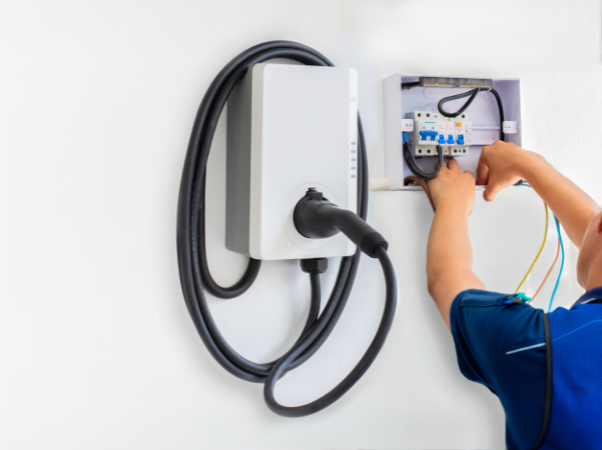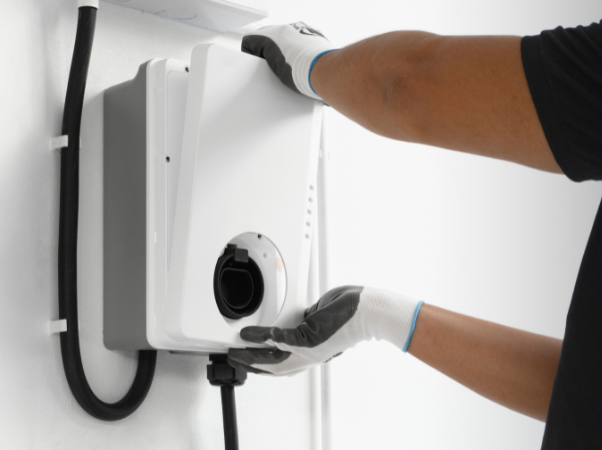 Free delivery on orders over £75 ex VAT
Free delivery on orders over £75 ex VAT Free click & collect from branches nationwide
Free click & collect from branches nationwideElectric Vehicle Chargers Installer Guide
With the UK banning sales of all petrol and diesel vehicles by 2030, and plug-in hybrids from 2035, an ever-increasing number of people are turning to electric vehicles as a clean, renewable-compatible alternative.
Take advantage of this and learn about what it takes to become an EV Charger installer with our handy installer guide.

Net Zero 2050 is fast approaching, and more car manufacturers than ever before are creating electric vehicles with bigger batteries, longer range, and more advanced technology to tempt consumers away from their internal combustion engines.
This has led to a surge in interest for EV chargers, for both commercial and domestic purposes. Therefore, It’s important for installers to be up-to-speed with regulations and best practices when it comes to installing EV chargers.
EV Charger installation requirements
EV chargers can be installed on any privately owned off-road parking, such as on a driveway or in a garage. A nearby wall or building is required to fit a wallbox charger, and the charging cable will need to be long enough to reach from the wall charger to the customers’ desired parking space.
Can a normal electrician install EV Chargers?
Fully qualified and registered electricians can install domestic and commercial EV chargers. In order to install a charge point, you’ll need to know up-to-date BS7671 wiring regulations in order to properly inspect and test your installation for customer usage.
BS7671 regulations state that EV chargers should be installed on a dedicated circuit that doesn’t overload or interfere with any other circuits.
Do I need to take a course to install EV Chargers?
It is highly recommended that adequate training is completed before installing EV chargers. Installers can take electric vehicle charger installation courses which cover:
- The IET Code of Practice for EV charger installation
- The different types of EV points available
- Design and placement considerations
- Electrical requirements for commercial and domestic EV charger installations
Take a look at our fully accredited partner training courses for more information.

What qualifications do I need to install EV Chargers?
The warranty on most EV chargers is only valid if they’ve been installed by a professional with an Electric Installation Certification (EIC).
Alongside an EIC, you’ll need the following qualifications:
- NICEIC registration, or certification from any other Part P Scheme Provider
- Once you meet the requirements, you can apply to become an EVHS registered (previously OZEV) installer.
What grants are available for EV charger installations
EVHS has ceased grant funding for detached, semi-detached, and terraced households - however funding can still be received for flats and commercial properties, in an effort to make home charging easier in cities and other urban areas.
If installers are fully qualified, they have the option of becoming a grant scheme installer. This scheme allows qualified installers to claim up to £350 back from each charge point installation on certain types of properties.
As of May 2022, the Workplace Charging Scheme extends to small and medium-sized businesses - including commercially let buildings, charities, and hospitality venues.
What home EV Chargers are available?
As EVs become more widespread, the average consumer may want advice on which EV charger to install, in order to get the best EV charger for their home and EV.
The most common choice for UK households is a 7.4kW charger, which will charge a typical 60kWh battery in around 8 hours. This is ideal for customers who like to leave their car plugged in and charging overnight.
Even a cost-saving, low-power 3.6kW EV charger will charge EVs much faster than plugging into a 3-pin wall socket. This could be the best option if the customer is working with a tight budget, or if they don’t require your car to be fully charged every day.

Which EV Charger is fastest?
Superfast 22kW-100kW+ chargers are also available, and customers may request them if they have an electric vehicle which can utilise these high charging speeds.
Unfortunately, most EVs are currently unable to charge that fast, meaning the extra power isn’t necessary for the majority of EV owners.
If a customer does request a 22kW charger, keep in mind that EV chargers that are 22kW or faster will require a three-phase connection to deliver the high charging speeds.
What’s a three-phase connection?
Some homes in the UK are powered by a single-phase connection - whereas others are powered by a three-phase connection.
- A single-phase connection uses one live wire to deliver electricity
- A three-phase connection utilises three live wires, meaning you could connect to all three for greater charging power
Most UK homes have a single-phase connection right now. However, customers looking to install an ultra-fast charger may be able to upgrade to a three-phase connection by contacting their energy supplier.
Is surge protection required when installing EV Chargers?
Whilst not strictly necessary, our renewables team does recommend installers equip each building with a SPD (surge protection device) installed in order to protect EV chargers.
SPD’s are usually fitted in fuse boxes or consumer units to protect EV chargers (and other electronics) from damage in the event of a power surge.
Do all EVs use the same plug?
Since 2014, it has been mandatory for electric vehicles to use the same ‘Type 2’ connector socket.
If a customer owns a pre-2014 electric vehicle, it may use the differently shaped ‘Type 1’ connector - however we recommend advising customers to install a type 2 connector regardless - especially since type 2 to type 1 adaptors are available.
Learn More and Become MCS-accredited with City Plumbing and GTEC
We've partnered with GTEC to offer MCS-accredited training to take your renewable installations to the next level.
Learn how to install Solar, Air Source & Ground Source Heat Pumps, EV Chargers, and all other main types of renewable technology. Become certified to upskill your business and take advantage of increased demand ahead of net zero.


